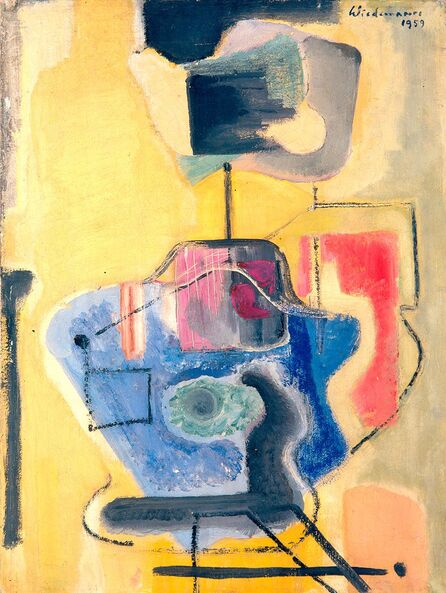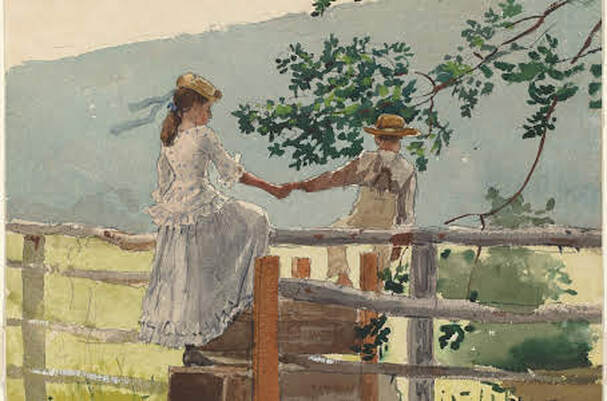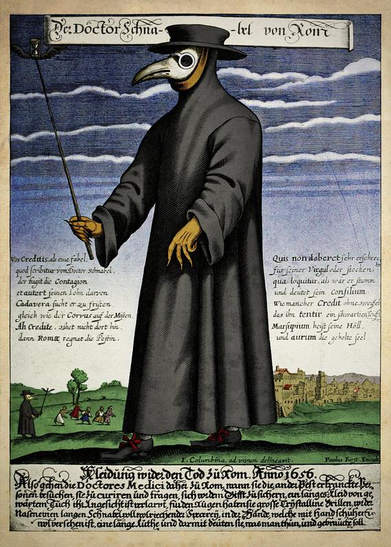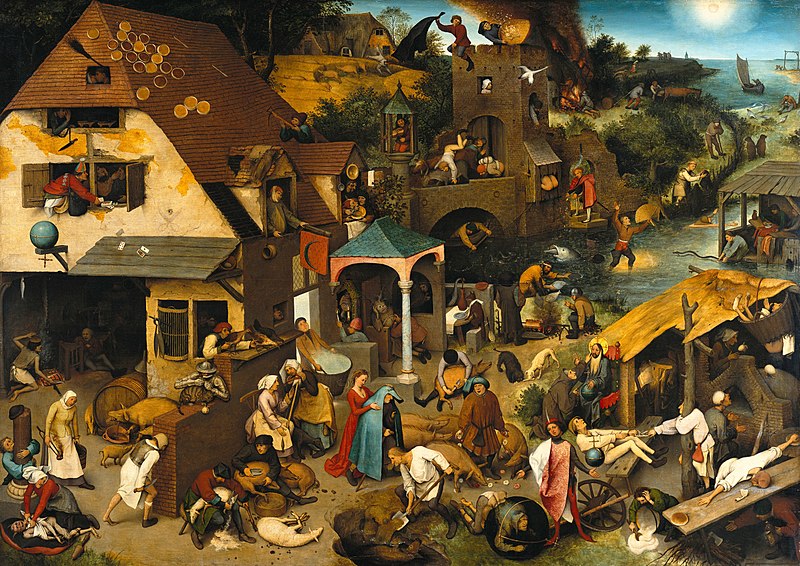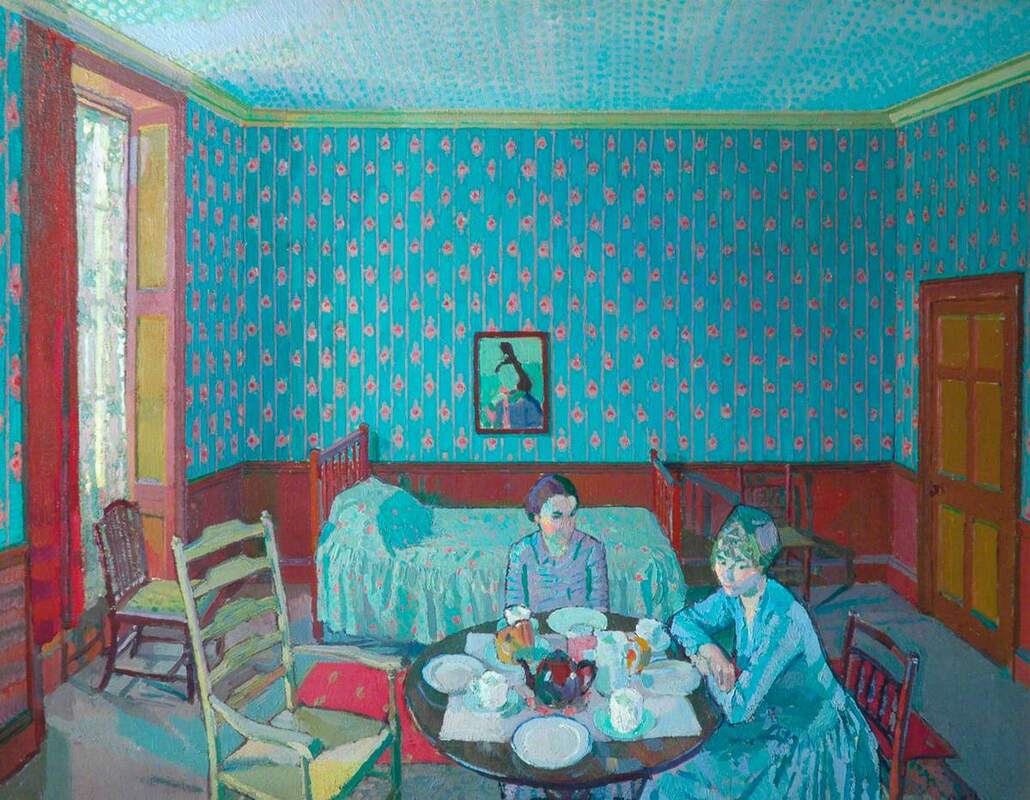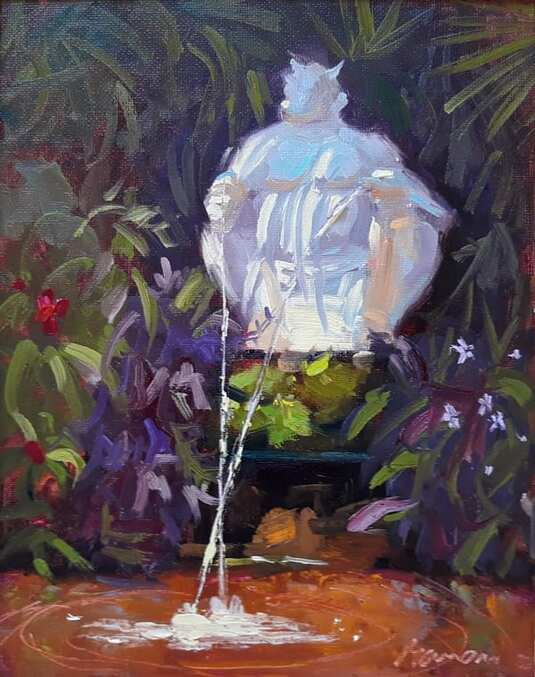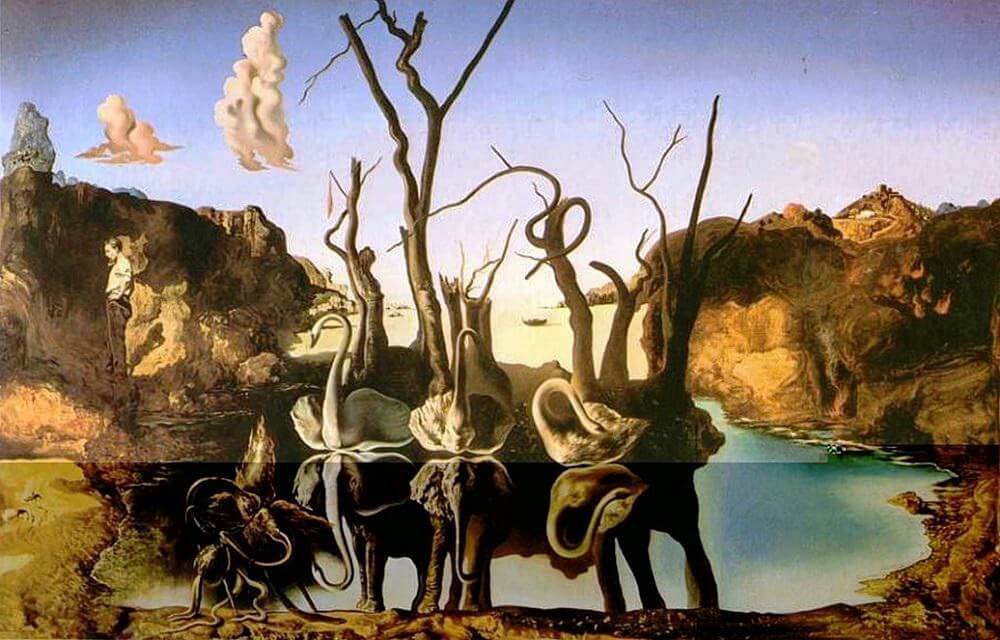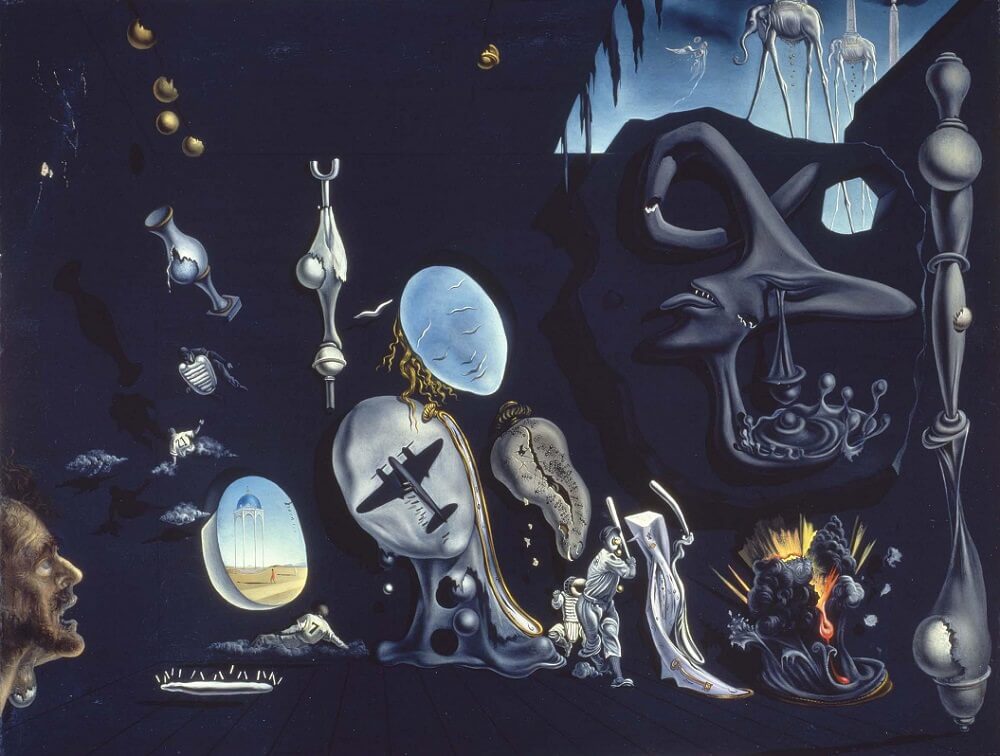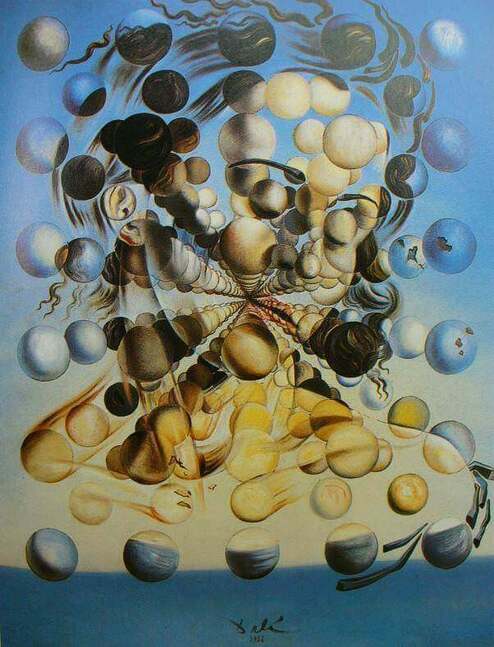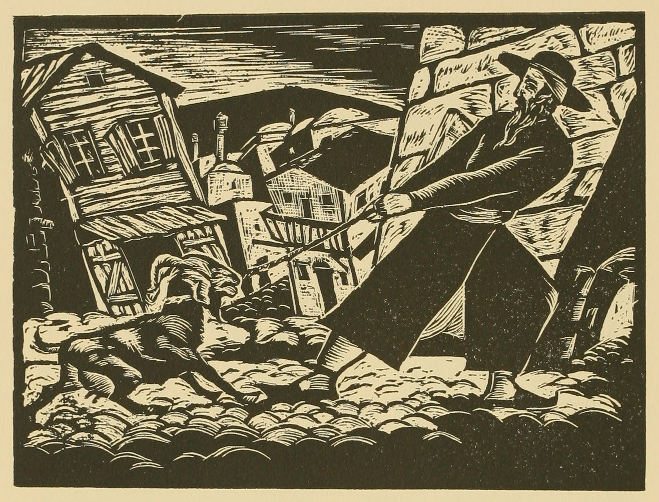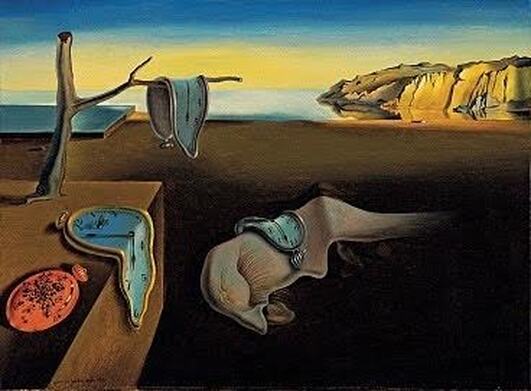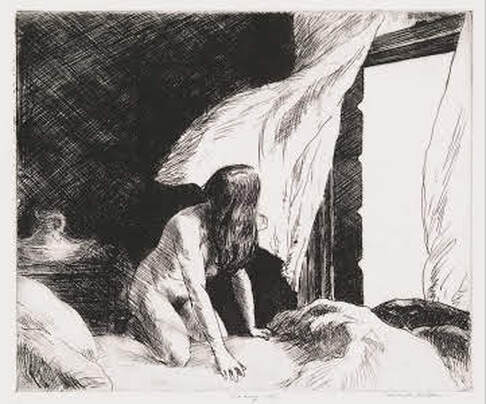|
Texas Torso "...that would not, from the borders of itself, burst like a star..." Rilke, Archaic Torso, translated by Stephen Mitchell "Having read this poems hundreds of times, I remain startled by that final gesture. I feel something has taken place that I am, and am not, prepared for." Mark Doty on Archaic Torso "It's the sound of 1000 deadly things coming toward us..." Star Wars, Episode One When my heart looks back into her sewing room (also her bedroom) I am the child sitting under an imitation mahogany table designed to hold her Singer, the royalty of sewing machines, heavy and black, embossed with gold. In this endearing sketch of family, I am her only granddaughter, bored but enchanted by her button box, dreaming the dreams of a poet: Her button box, an old cookie tin was covered with dented fairies, slight-shouldered, scratched in the black night on the lid. And even under a new moon, light was coming from old wings, gold strings, looped and scattered -- And how, I thought, those fairies could fly in the exotic kingdom of sewing, buttons for coats and uniforms, insignia for the queen's footman, and majestic birds for the tunic of a prince, though I wasn't Cinderella beneath the royal Singer, my childhood wealth, those buttons, twin black onyx with gold centres, and a whole card with mother of pearl. If it can be said that a first grade teacher can have a passion, a weekend career created by her past, my grandmother's was sewing -- coats, suits, dresses -- everything she and my mother would wear during the Great Depression; and that I, in Austin, would find old- fashioned, yearning for store-bought clothes like my friend's -- yet how often I think of her hands, the way they'd traveled over fabric since 1902, the year her mother died when she was twelve and the year her father gave her a family title -- Tailor -- drawing around the size of each of his children to make paper patterns for clothes she'd sew to fit his large family of motherless children... And aren't we all orphans in some way or another, our memories made of noble fabrics worn like leftover dreams of the day -- sky and shame and sunlight -- blue and yellow and black for mourning? Flying, sometimes, almost free, a Calder mobile hung from heaven? Or a patchwork of abstract emotion, shapes divided on a family tree (one family member a crazy guilt) all this in a hypothetical morning that comes to life in my grandmother's sewing room (a description, pre-Picasso) where the fabric of life takes on a second meaning -- time unfastened, life in motion -- the art of living on the surface of a shattered dream; when, as suddenly as love and counting priceless buttons, happiness is altered to the shape of random moments, the painless shock of knowing what we'd thought shame and imperfection is only damaged innocence -- ii, Figure and what, if we were clever, comes to life transformed by art: a body of collective fictions in the somewhat buxom upper torso of a dressmaker's mannikin in blue. a still-life animated by the eye of a contraption worn over its headless body like an antennae panning the macrocosm to tell the story of Wiedemann's Figure (his Exquisite Corpse) oil on canvas -- perhaps the pattern of a lost great aunt called Sophie -- or Zina, one of my grandmother's sisters, who left to be Mayor of some tiny town in Texas no one had ever heard of. [How many men would those sisters love, the artist, the musician, and Zina?] Under my grandmother's sewing machine, reality was never an obstacle, as it had never been to the sisters whose torsos (unlike Apollo's, archaic, made in marble) could be made with art and cartography, a map like Wiedemann's. with a dot on a mannikin's shoulder (x marks the spot for a beginning, though some might call it a bullet hole, gun play to identify the Texas Torso) the map's starting point for a thin blue line that runs steady to the truncated throat of a mannikin -- call it Aunt Marjorie's well of goodness, where she learned to sing near water and the musical fire of her father, a black smith, making horseshoes and ties for the railroad, a renaissance man, my great grandfather, who painted glass, taught penmanship and Latin, moved to Texas and built the school house, one room where his daughters graduated together -- teachers, musicians and artists -- my Aunt Virginia, "Vergie," who began to draw where the blue line detours south, to the mannikin's left shoulder -- to the heart and Virgie's art -- where the model for sewing begins to change into Widemann's Figure. Texas, and the world, had survived two wars and catastrophe, sometimes loss so great (mine and others) that it's surprising to find a second figure bathed in light -- how did he invade this space with unnamed shapes, coming toward Widemann's blue Figure wearing a crown of sunlight, an abstract expressionist's Apollo, illuminating part of the painting In the way Sunday morning came into my grandmother's sewing room like a yellow dress to complicate my future -- like love -- my first -- a blind date -- my torso in a strapless slice of Texas. Laurie Newendorp Laurie Newendorp, a native of Austin, lives and writes in Houston. The Ekphrastic Challenge has become an uplifting part of my life, releasing positive endorphins and memories: my grandmother and her sisters, my great aunts, were pretty, hard working Texas women. I like to think of them finding their individual talent while my great grandfather "fiddled" -- he loved his violin -- music floating in the summer breeze after they'd finished their farm chores. ** Figure it Out She tries to fit herself into the class shaped hole but the squeeze is too big, muffled voice too loud her echo, scream, mutter oozing through tight walls, flowing down tunnel tapered corridors. Someone places ear muffs securely over her head to protect her from the world, a pilot preparing for take off through another tight angled day, runway littered with obstacles. They think she is learning, the specialists as she feels her way through soft curved spheres and sharp-edged cubes, gaining clarity but her discerning eyes see only the shapes between the differences, never the symmetry. Kate Young Kate Young lives in Kent with her husband and has been passionate about poetry and literature since childhood. Over the last few years she has returned to writing and has had success with poems published in webzines in Britain such as Nitrogen House, Nine Muses and Words for the Wild. She is a regular reader of Ekphrastic Review and her work has appeared in response to some of the challenges. Kate is now busy editing her work and setting up her website. Find her on Twitter @Kateyoung12poet. ** Figure These people, they don’t like me because I’m blue, mainly, or just because my background is yellow. There are things in my past I’d rather not discuss, not because they’re unseemly, mostly, but mainly I don’t really understand them. My background is not my fault or my responsibility. To explain, I should first ask you to allow me tell you about blue. It’s not the simple blue of sky or certain fruit, or even the shirt I’m wearing, which is the blue of most shirts I wear. Let me tell you about this particular shirt. It’s a bit worn at the neck because I don’t shave on weekends which is mainly when I wear it, and on one sleeve the threads are beginning to unravel. I don’t blame others for this. Very well, it’s faded. My wife hates it. And I don’t remember where it came from. I didn’t wear it more than three times last year because I was so ashamed. (And how well we all know shame is a killer.) Today, however, is the second day I’ve worn it in a row. Why? Because it’s so comfortable, an old friend, and because we are practically quarantined for the first of many times this century. I’m not going anywhere, and no one can smell me. Maybe I bought it in California all those years so long ago when we were happy. Of course you may ask, were we really happy? They say the mind prefers rose-colored spectacles. I prefer a red door that leads to a hallway with green carpeting where you can smell chicken paprika that’s been cooking all day. The landing is parquet, and squeaks a little, and the stairs are worn marble, so smooth, like the backs of geese, you have to be careful where you step so you don’t break your neck. At the bottom of the long winding staircase the air is fresh, and you follow it out into the darkening street where everyone is happy. Men in jackets and ties escort bouncing ladies with bright lips and hair piled up like haystacks in August on their way to bars where they order drinks that look like paradise in cut crystal tumblers. Is there really such a street? Then I realize while I was gone someone struck up a tune on the old baby Steinway in my apartment. I didn’t even know we had a piano. My wife has learned to play Schumann’s Von fremden Ländern und Menschen while I was out sniffing around for the perfect mousseline. Then I realize my blue shirt is ruined. The red door is bound by the outline of its own fears. And the yellow wallpaper, which my grandparents had cherished, has been torn down, the plaster patched and painted over to look like Christmas trees. David Ruekberg David Ruekberg lives and teaches near Rochester, NY, and earned his MFA from Warren Wilson College. Poems have appeared in Barrow Street, Lake Effect, Mudfish, and elsewhere. His first collection, Where Is the River Called Pishon? was published by Kelsay Books in 2018. FutureCycle Press will publish Hour of the Green Light in January, 2021. More at https://poetry.ruekberg.com. ** Baghdad Want to see what the "hayi" (neighbourhoods) of Baghdad look like? Each shapeless blob is a "hayi." Each colour of each blob is a separate culture is a neighbourhood I patrolled. Each "hayi" stops and starts in crossing a street. Nothing blends nothing blurs nothing fades. Each formless shape exists to exist. No links no tentacles no stitches sew one to another. Nothing is within another; it’s one dimensional. With the mathematical certainty of Flatland; Certain disorder and certain confusion. Larry OHeron Larry OHeron lives in Rochester NY. He is retired and taking classes at Writers and Books, Rochester NY as a way of exploring and developing his interest in the writing arts. https://caminoadventure2019.blogspot.com/ ** Christmas Card Santa Claus is a yellow dove flying in a blizzard the colour of custard. His eight reindeer have disappeared. Perched high on an olive branch, he steers his sleigh westward with periwinkle wings flying eastward. His wavy sac of packages trundles on rusty metal runners clunking, “Clankety-Clank-Clank-Clank.” He lets loose a black silk ribbon. He air-drops abstract presents into evergreens of nesting birds. An eyeball wrapped in blue tissue paper falls from the sky onto festive boughs below dotted with make-believe snow. Imagine all the magpie treasures for winter warblers who sing and rejoice in gifts of birdseed and wonder. Nature’s choir is heard throughout the city on Christmas Eve. Tanya Adèle Koehnke Tanya Adèle Koehnke is a member of the Scarborough Poetry Club. Tanya’s ekphrastic poems appear in The Canvas and Big Arts Book. Tanya taught critical writing about the visual arts at the Ontario College of Art & Design University (OCADU). Tanya also has a background in arts journalism. ** lockdown in theory there is light some have called it golden or warm you might wonder why i have not seen it which is a natural question to ask so let’s say i live in a home and the walls are so black and thick i find myself isolated thus filling with ache and let’s say this ache is quite monster-like spawning long tentacles that entomb my body like a mummy cloaked in darkest night Tiffany Shaw-Diaz Tiffany Shaw-Diaz is a poet and artist who lives in Centerville, Ohio. ** Commendation On those days when the dogwood of your body bursts into flower, when the hurricane winds withdraw with a holy hush from your eye, when you luge from joy to joy, runners this side of catastrophe, when every passerby takes the time to witness you top to bottom, when the divine light within you oozes like an amber sap, when you are tychomántis and zipline, pianoforte and tympani, then you know you have succeeded all the other days of your life, keeping the knife safe in its drawer, the bullet mute in its chamber. Devon Balwit Devon Balwit's poems, like the poet herself, can be found here and there. For more, see her website at: https://pelapdx.wixsite.com/devonbalwitpoet ** Self-Portrait in Quarantine Day 20-something: can you believe I’m growing paler? The raised-by-wolves hairdo isn’t helping either, so I’m avoiding mirrors. Instead, I’ll look inward, paint a self-portrait. I try cubism: no need to change out of jammies or examine my face. Replace my head with an open book – a nod to realism. No arms or legs since I’m frozen in time. My heart flattened into a greeting card, my torso a dressmaker’s form, parts of me wired together with coat hangers. My third eye wanders to my gut and stares back without blinking. Alarie Tennille Alarie Tennille was born and raised in Portsmouth, Virginia, and graduated from the University of Virginia in the first class admitting women. For Alarie, looking at art is the surest way to inspire a poem, so she’s made The Ekphrastic Review home for four years. She was honoured to receive one of the Fantastic Ekphrastic Awards for 2020. Alarie hopes you’ll check out her poetry books on the Ekphrastic Book Shelf and visit her at alariepoet.com. ** Wheelchair Woman Her wheelchair has a 5.7L HEMI V8 engine with fuel-saver technology, chrome-clad dual exhaust pipes & aluminum wheels, a six-speed standard transmission with a leather-wrapped stick shift & a leopard skin seat. It is a modified lowrider with hydraulic pumps connected to its shock absorbers. She hip-hops through crowds & woe to him who gets in her way. Jimmy Pappas Jimmy Pappas received an MA in English literature from Rivier University. Published in over 80 journals, he is the Vice President of the Poetry Society of NH. His poem "Bobby's Story" was one of ten finalists in the 2017 Rattle Poetry Contest and won the 2018 Readers Choice Award. It is included in his first book Scream Wounds, a collection of poems based on veterans' stories. He was the winner of the 2019 Rattle chapbook contest for Falling off the Empire State Building. His interview with Tim Green is on Rattlecast #34. ** Figure of Speech “Mad world, mad kings, mad composition,” said Shakespeare’s King John speaking anaphorically. Who could disagree in those times or in these or in most times in between. It takes an abstraction to show it clearly, to figure it out. A figure to illustrate it perfectly. A figure that sums it up A figure that says it all. Lynn White Lynn White lives in north Wales. Her work is influenced by issues of social justice and events, places and people she has known or imagined. She is especially interested in exploring the boundaries of dream, fantasy and reality. She was shortlisted in the Theatre Cloud 'War Poetry for Today' competition and has been nominated for a Pushcart Prize and a Rhysling Award. Her poetry has appeared in many publications including: Apogee, Firewords, Vagabond Press, Light Journal and So It Goes Journal. https://lynnwhitepoetry.blogspot.com or https://www.facebook.com/Lynn-White-Poetry-1603675983213077/ ** See Me You try to avoid facing my blindness. I am so much more than my eyes and what they can’t see. Look at me, do… Music lives in my liver, poetry in my heart, depths you haven’t plumbed come up through my bowels, a fire burns in my soul, passion in my flesh, my useless legs move in dance. Hold me. Light warms me, swells me, lusts me. Fresh waters lap against my shores. Words fill my imaginings, my world is filled with colours you will never see. My body can’t move, but I plane like a condor, rise like a skylark, sing like a nightingale. Perhaps my song would overwhelm you, I can feel your alarm and shall cover my eyes. Rose Mary Boehm A German-born UK national, Rose Mary Boehm lives in Lima, Peru. Author of two novels, one full-length poetry collection and two chapbooks, her work has been widely published in mostly US poetry journals. Her latest full-length poetry MS, The Rain Girl, has been accepted for publication in June 2020 by Blue Nib. Her poem, "Old Love’s Sonnet," has been nominated for a Pushcart by Shark Reef Journal where it was published in the Summer of 2019. ** Best Unspoken She dares not utter the “C”-word. Too much power in that, she says. And yet, like the splitting of atoms, her spirit fractures with each new report-- how the oncologist so easily echoes that word as if as common as mowing the grass, or, again, the way blades of hair fall like mulch into the trash where the remains of breakfast, smelling of chaos and rebuke, offend the sensibilities of the universe, returning every word not void. Tammy Daniel Tammy Daniel was selected as one of the New Voices of 2015 by The Writers Place in Kansas City, Mo. Her work has appeared in I-70 Review, Touch: The Journal of Healing, The Ekphrastic Review, Dying Dahlia Review, Wild Goose Poetry Review, Red River Review, Rusty Truck, and Ink, Sweat and Tears. ** American Sonnet for My Cat I do not see you lounging in a chair, certainly not caring to pose for somebody, more like perching on top of a chair near the bright yellow of a living room wall. I do not see navy blue or carnation of your body, not part paint palette, not part base of a floor lamp whose light you would not want turned on. I do not hear a bird song as soothing, more like alarm as you attempt to protect me from the blue futon position. You are tortoiseshell, named Mardi Gras, but as a collage of tan and dark. Throw-up heaved on the egg-yoked floor is not unlike ambers of a campfire popping the night before the mud locks in. We live in a two-story box, not as figures in contrast, more like shapes hiding in a brown paper bag. The bones of your escape. Outside is now your pleasure and nightmare. It does not matter to love you. Trying to find you is not enough. John Milkereit John Milkereit is a mechanical engineer trying to survive in the oil & gas industry, who lives in Houston, Texas. His poems have appeared in various literary journals including The Ekphrastic Review, San Pedro River Review, and The Ocotillo Review. He completed a M.F.A. in Creative Writing at the Rainier Writing Workshop in Tacoma, WA in 2016. His most recent collection of poems, Drive the World in a Taxicab, was published by Lamar University Press. He is working on his next collection of poems. ** Sketchy Shepherd He recalls conspiring where none transpired. In his memory, the self is tall, masquerades as transparent ace interceding for ignorant innocents, abandoned whelps refused compassion, visible solar- plexus chakra emanating self-care. Meanwhile, in a pose stylized for its best effect, stance eclipsing thin reflection, he ascertains their devoted whimpers, whispers hovering alive like fireflies. D. R. James D. R. James has taught college writing, literature, and peace-making for 36 years and lives in the woods near Saugatuck, Michigan. His most recent of nine collections are Flip Requiem (Dos Madres Press, 2020), Surreal Expulsion (The Poetry Box, 2019), and If god were gentle (Dos Madres Press, 2017), and his micro-chapbook All Her Jazz is free, fun, and printable-for-folding at the Origami Poems Project. https://www.amazon.com/author/drjamesauthorpage ** without, as within without, expansive beyond the window imposed by discretion, turmoil relative to distance in pursuit of resolution, recognition within, assaying senses now expanding, distanced one from the other, sight and sound secondary to perception, turmoil resolved through reflection which is without, which within? Ken Gierke Ken Gierke is a retired truck driver who enjoys kayaking and photography, but writing poetry brings him the most satisfaction. Primarily free verse and haiku, his poetry has appeared at The Ekphrastic Review, Amethyst Review, Vita Brevis, and Eunoia Review, as well as at Tuck Magazine, and can be seen on his blog: https://rivrvlogr.wordpress.com. ** The Top Three Most Important Items in 1959 I can’t remember being a year old, but Guillermo, Uncle G to all of us, never ceased to remind me. Stories blew through the air by the chair in front of the telly. The hanging lamp--all modern edges and pre-Sixties space--always on his right. News that ran a bit toward the red or sat atop the yellow never left Uncle G’s lips . . . if it ever crossed his mind. All that mattered in our house were indiscriminate strokes and lives full of primary colours. an empty chair unmoved since last Thursday swayed back flowers in a vase bare a sympathy card Todd Sukany Todd Sukany, a Pushcart nominee, lives in Pleasant Hope, Missouri, with his wife of over 37 years. His work recently appears in The Christian Century and Fireflies’ Light. A native of Michigan, Sukany stays busy running, playing music, and caring for four rescue dogs, a kitten, and one old-lady cat. ** Pirka Wood Unwrapping a caul birth, eclosing. Drying wet orange wings, brush-feet hooks. Small heath butterfly. Translucent, sheer, gossamer. I remember how by the creek, I walked with you once. On a summer day. When you stood at the gate. Vanished house left unlatched. I sit still. I keep watch. I am the wound. The nectar of flowers. Minimalist lyrics. Your mother tongue. Land of bluebells. Where swamp milkweed grows. Gypsum forms the hills. Scratch a line into the paint. Bleeding through gampi paper. Ghosting. Puckering. Warping it and rubbing it out. blossoms fall full moon caught in thornapple come tit, it is late Ilona Martonfi Ilona Martonfi is an editor, poet, curator, advocate and activist. Author of four poetry books, the most recent collection is Salt Bride (Inanna, 2019). Forthcoming, The Tempest (Inanna, 2021). Writes in journals, anthologies, and six chapbooks. Her poem “Dachau on a Rainy Day” was nominated for the 2018 Pushcart Prize. Artistic director of Visual Arts Centre Reading Series and Argo Bookshop Reading Series. QWF 2010 Community Award. ** Beleaguerment Stiff legs, backs askew, we slump in the same old chairs at our sanitized screens. We plot graphs, wait for curves to peak and fall in the pinks and greys of passing days and hope that the febrile figure at the red door won’t come any nearer. Great dove, descend into our darkness, alight on us as we splutter in blue isolation, encircle us in healing light. Helen Freeman Helen Freeman has been published on sites such as Ink, Sweat and Tears, Red River Review, Barren Magazine, The Drabble, Sukoon and the Ekphrastic Review. She now lives in Durham, England after many years in the Middle East.
1 Comment
On the Stile Tom led Caroline across the stile. Her blouse and ribbon took some blue from the hills and that same blue was on the fence boards as her eyes adjusted to the shade. She took care in her good shoes on the tall steps. Their hands passed over the ridge of the fence like a knot in a rope and they tugged against each other as she took the top step after him. His hands were already rough from woodwork and once she’d seen him bend a tenpenny nail. A memory came to her. She remembered the coast when their mother was pregnant with Tom. She remembered the sand, cold, and pouring it into their father’s wide hands and the expanse settled under the sky. Caroline looked out to the foothills, now rolling under the haze—the mirage of afternoon. “Oh, Thomas,” she said, “do you see all that blue? That’s what the ocean looks like.” Alex Leavens Alex Leavens has worked as a naturalist for the Portland Audubon Society, backcountry ranger and firefighter in the Olympic National Park, and primitive survival instructor in Southern Utah. His poetry has appeared in Cirque: A Journal for the North Pacific Rim, Windfall: A Journal of Poetry of Place, Perceptions Magazine, Clover: A Literary Rag, Tiny Seed Literary Journal, Frogpond, and Modern Haiku. Dear Readers and Writers,
Longtime Ekphrastic contributor Robbi Nester is curating and editing an anthology for our times called The Plague Papers. She wants your ekphrastic prose and poetry! Send up to five pieces inspired by an artwork or an artefact at any virtual museum or collection. In addition to considering writing inspired by art, you can use prompts from nature or history or anthropology/archeology from any online collection: zoos, aquariums, medical collections, etc. Send up to five poetry or short prose works responding to the specimen, object, or art to Robbi Nester at rknester@gmail.com. Please include a link to the image you chose and your email address, brief bio, and a Word doc. Deadline is May 31, 2020. The Ekphrastic Review is happy to post calls for ekphrastic projects of any kind. Please send us a note with details and we'll post the information on your behalf. Adagia for the End of Our World Proverbs are a treasure house or live within a lake held in common property. We fish for them like trout and recipients nod and reckon they have heard this one before. If I were to tell my ancestors about our heat, they would detect a tall tale, I would hear them hiss: go fish. Erasmus thought proverbs were gemstones we set, and deemed it garish to use too many. He used the following metaphor: a painter projects figures in a painting so that the shadows do not overlap with other figures. But take Bruegel, and his Netherlandish Proverbs. He fit 119 in his. Here, already: our house is on fire. Yet, what can smoke do to iron? It takes a level of picturacy to work one’s way through this painting. And there are so many proverbs here we can no longer read: taxidermy of lost tongues, frozen in oils, crimson, earth, azure. Memento mori. Proverbs are as weak as life. Consider the frailty of the crocodile always shedding so many tears in vain. Dropping tears worth nothing. There are tears that are worth something, like pearls. There are things of capital importance. Sit tibi Terra levis. Netherlandish always sounded like Outlandish to me, which is how I think of the Earth. In Bruegel’s Netherlandish Proverbs: Some catch fish without a net. One shears sheep; the other, pigs, but mostly, albeit the proverb’s predilection for housing animals within its walls, I see humans, almost a hundred, densely populating a house, a yard or inlet, densely pressing one against the other, teeming. Foregrounded. Anthropocene. The world turned upside down. A man yells to the heavens for mercy. Another is armed to the teeth: expecting the unexpected, in shining armor, blade between two lips. Proverbs shelter our faith in murmurs. They exceed time: in them, things happen aren’t happening, unlike in Bruegel’s painting where simultaneous scenes are happening and overlap, for a second. I blink. This is the way of the world: Big fish eat. Small fish never had a chance. Stones can duplicate in mid-flight to kill two birds, whose fall in mid-air is only like a book falling defoliating itself in wounds. Finders, seekers. What killed the cat? She was a hard-working cat, came home on Sundays. Fed her children, a cluster of grapes but tarter, with lactic acid. What killed her? We need to know, we need answers. Wisdom is wisdom is wisdom. Intertextuality is a form of expropriation. Expropriation is God kicking Adam out of heaven. The original sin all along was being an owner of property. All roses are not not roses. Not all that glitters is mine. A mine a day keeps the miners away-- or dead, or both, like parrots underground, faint, feathered. Alea iacta est. Proverbially. Better late than-- Today: Oil is thicker than water. Marbled film of fuchsia and patent jet. So don’t cry cat tears the day of weakened bonds. Don’t cast pearl drops before the swine, not over spilt oil, plastic, milk. Better to business as usual. Consider Bruegel’s crane starting its migration, right next to our house on fire, leaving towards another land, more temperate, her white span feathering, untarnished, gleaming in sun spill and maybe returning and returning here never pausing her flight waiting only for us, the blind leading the blinded, to give her a signal to Land. María Gómez de León María Gómez de León is a Mexican writer, based in Mexico City, where she studied English Literature at UNAM. She is currently assembling her first collection of poetry, nestled in a 215-square-feet apartment in Colonia del Valle, at times longing to be outside, where jacaranda and colorín flowers stipple the sidewalks in scarlet and lilac; at times, outside. tea in the bedsitter inspired by the painting by Harold Gilman, 1916 summer beats down on my Maple Street bedsitter highlights many empty chairs in this small blue room their backs as straight as headstones Amelia came to see me to tell me about her telegram I listen although if she mentions white feathers again I will leave walk straight out into the Fitzrovia afternoon she purses her mouth face pinched I look away listen to Mrs Mounter downstairs as she sweeps a clean floor polishes unused crockery Mrs Mounter came earlier with her Brown Betty full of steaming tea which sits untouched on the table among empty plates and cups the newspaper she brought was full of pretty names Somme Picardy Verdun Amiens Flanders where our boys and men have gone the smell of freshly baked bread rises from downstairs makes my empty stomach somersault while the tea cools in the pot undrunk still Amelia stays her loss as thick as dust while the sun changes direction slants through lace curtains onto my face and neck Annest Gwilym Annest Gwilym is the editor of the webzine Nine Muses Poetry. Her writing has been widely published, both online and in print. She has both won and been placed in writing competitions. Her second book of poetry - What the Owl Taught Me – will be published by Lapwing Poetry in 2020. The Others Stood Sated and haunched half in foliate shadow, the waterman mooned the minutes away at play with his essence in the mild May sun. He thought back, to the lime tree, the maidens' dance. The chance he took in taking one, with only a pretty wreath and feral truth as bait, as she threw feeble loops about mothers and fear and the others stood in laurel-like paralysis. He smiled when he remembered this. The light kissed the surface of his crystal hall. He did not hear their approach. Through the dark growth, anger honed to machete edge, her sisters came to avenge her, to bloody her riverine grave red as tea, and collect their morning gifts. Brian A. Salmons Brian A. Salmons is a poet and translator from Orlando, Florida. His work has appeared or is forthcoming in Eyedrum Periodically, NonBinary Review, Poets Reading the News, The Light Ekphrastic, Eratio, and others, including anthologies from YellowJacket Press and TL;DR Press. Dear Salvador: a Personal Letter to Dali Salvador, we have to talk. I've just lined up three of your paintings, and I have to say, you really painted yourself into a corner. You set out a showman, shocking, going beyond limits. It is 1937 and you completed Swans Reflecting Elephants. Your surreal period is in its golden age and you report of yet another dream state—visual images, hallucinatory forms, and doubled decked images—confronting common sense experience with uncommon implications. Three hyperrealistic swans cast reflections in water that present as elephants, as tree trunks become legs, clouds cavort as sensualize bioforms, and you even include yourself trying to make sense of it all. Everything shifts under our gaze, and you’ve painted us into a conceptual corner. But suddenly its 1945. In the midst of global convolution, the science you adore has produced a bomb, and that miracle of achievement has just vaporized whole cities. Particle theory mixed too nicely with our dark angels, and shoved your metaphysical parlour games and playful optical tricks with swans and elephants to the sidewalk. Now you paint Melancholic Atomic and Uraniumist Idyll, a not-so-still life where everything is—really—going to hell. More than clever concepts, here. By 1952, however, the implications really set in, and this time your elephants and swans had much heavier lifting to do. You paint Galatea of the Spheres. Gala—your beloved wife, the embodiment of all good, all that you yourself worship—deconstructs into a set of dissociated spheres—atomic particles—with infinite regress. Treasures, supposed values, all that we love most dearly, prove themselves ultimately empty. And it’s coming around again. You were prescient, Salvador. Now I’m seeing my world dissemble, watching all the rocks and elephants, like Gala, turning into swans and flying away into night. Kendall Johnson Kendall Johnson writes and paints in Upland, California. He is the Director of Gallery 57 Underground, Pomona. Kendall is author of several non-fiction books on psychological crisis and trauma, and four books of poetry: Fragments: An Archeology of Memory; Johnson’s Pasture: Living Place, Living Time; A Whole Lot’a Shakin’: Midcentury Reconsidered: and A Sublime and Tragic Dance, co-authored with John Brantingham about Robert Oppenheimer. Goats Evade Demands and Chains The pull of the goat is the pull of tradition and my world is slanting, as predicted. The goat knows it needs milking before sundown. The goat knows the lean of my black-panted knee mirrors the jutting bend of every diagonal line of this town, stacked homes held together with broken hinges, swinging shutters into slices of sky. Bodies yank away from the centre. The house needs straightening. The town is tilting. In Chicago, small moments of Russia stack up like apartments until the zigzag of slippery stone walkways disappear into a lost horizon. I am in focus, gape-mouthed. I refuse to undress my part. The world is spinning – who are you? I am going home on Shabbat but home is a void burned to the ground with all holy histories of existence. Our beautiful white candles burn slow in the faces of sweet children. I arrived in Chicago wearing the same clothes. Please, let’s go home, little goat. If we can find it. Jamie Wendt Jamie Wendt is the author of the poetry collection Fruit of the Earth (2018) and winner of the 2019 National Federation of Press Women Book Award. Her poetry, essays, and book reviews have been published in various literary journals and anthologies, including Feminine Rising: Voices of Power and Invisibility, Lilith, Literary Mama, the Forward, Third Wednesday, and Saranac Review, among others. She holds an MFA from the University of Nebraska Omaha. She teaches high school English and lives in Chicago with her husband and two children. https://jamiewendt.wordpress.com/ Time Slips Fades and flops like a towel thrown over a rack. A face someone wore washed ashore, surreal lashes closed prettily in sleep. Heebie jeebie ants gather like onlookers slowing for an accident. A cold, metallic platform stands in the dark, barren sand as though awaiting an autopsy. Empty husks mask the tree-snagged landscape; the still-bright sea out of reach. Laura Engle Laura Engle: "I am usually occupied in the field of healthcare administration and have been for more than thirty years. My husband Todd and I live in the pioneer town of Aurora, Oregon which was a communal experiment in frontier idealism. The original townsfolk shared their wealth and produce, put everyone’s kids through school and college, and were expected to play an instrument. It didn’t last, but we like to think we would have made the cut. We have thirty fruit trees growing on a fertile half acre behind our house where we also keep bees, goats, and chickens who are named after television sitcom characters from the seventies. Our daughter Emily and her husband Oz own and operate the local bakery, The White Rabbit. Todd and I work at a nearby retirement community. Todd plays classical guitar. I am still in Book Two for piano, but I persist." Evening Wind: Drawing and Print # The window is open and the woman is naked at the foot of the bed leaning towards the window trying for the breeze. The curtain is blown back behind her over her shoulder, the bed is rumpled from her tossing all afternoon in the heat. There is a pitcher of water on the bedside table and a picture of something in a rectangular frame centered upon the wall directly behind her. It is a landscape or a horizon of the kind favored by those who live in small one-windowed rooms, it is a still-life of sorts and she has studied it for hours. # She was rising to refill the pitcher on the table when she felt his eyes upon her as a sudden gust of wind tore back the curtains from the window and he saw she saw him staring. He turned around quickly, walked on down the street, looked back over his shoulder just once to catch her leaning just out far enough to see him go. She is alone and not expecting anyone or thing to change that. She imagines him believing she’s left him for another but she’s left him for no one and fears she may regret it. Bruce Taylor This poem first appeared in Pity the World: Poems New and Selected, Plain View Press, 2005. Bruce Taylor's poetry appears in such places as Able Muse, The American Journal of Poetry, The Chicago Review, The Nation,, Poetry, Rattle, and on the Writer’s Almanac. His most recent collection is Poetry Love Sex Music Booze & Death, 2018 |
The Ekphrastic Review
COOKIES/PRIVACY
This site uses cookies to deliver your best navigation experience this time and next. Continuing here means you consent to cookies. Thank you. Join us on Facebook:
Tickled Pink Contest
April 2024
|
